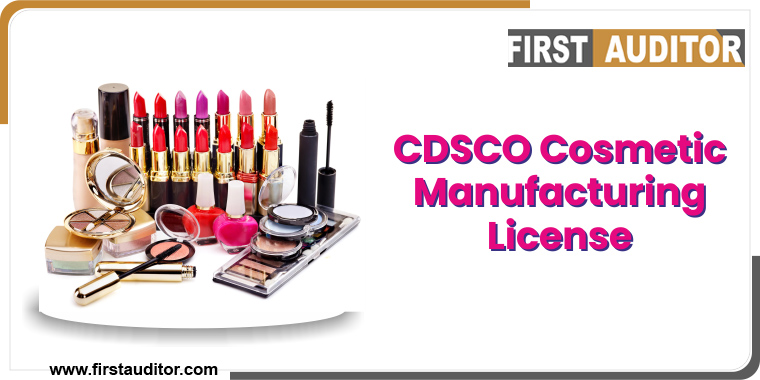In India right now, the cosmetics sector is booming everywhere from TVs to social media platforms. Whether they are male or female, people use cosmetics all around the world. Because of the enormous demand for cosmetics, which has drawn government attention because we already know that with great power comes great responsibility. Cosmetics are governed by the CDSCO (Central Drugs Standard Control Organization) in India, and CDSCO Cosmetic Manufacturing Licenses are governed under the Drugs and Cosmetics Act, 1940. Before 2013, there was no such requirement, but starting in 2013, all imported cosmetics for sale had to register with the DCGI (Drug Control General of India).
Customers these days are curious about the items' constituents and use that information to decide which ones are worth purchasing. Therefore, you must first obtain a CDSCO Cosmetic Manufacture License in order to launch a new cosmetics company and carry out product manufacturing, selling, and distribution. After that, registered cosmetics must attach a distinctive label bearing the Registration Certificate Number.
| Different Classes of Cosmetic Products | |||
|---|---|---|---|
| Hair colourants | Hair setting products | Lips product | Skin-whitening products |
| Face masks | Toilet soaps | Emulsions, creams, lotions, oil & gels for the skin | Make-up powders |
| Face masks | Deodorants and Antiperspirants | Products for waving, fixing hair, and straightening | Mouth & teeth products |
| Anti-wrinkle products | Shower & bath preparations such as salts, foams, oils, and gels | Hairdressing products such as lacquers, lotions, brilliantine | Make-up and products removing make-up |
| Products for external intimate hygiene | Sunbathing products | Depilatories | Hygienic powders |
| After-bath powders | Tinted bases (pastes, liquids, powders) | Shaving products (lotions, creams, foams) | Toilet waters, perfumes and eau de Cologne |
| After-bath powders | Tinted bases (pastes, liquids, powders) | Shaving products (lotions, creams, foams) | Toilet waters, perfumes and eau de Cologne |

The Central Drug Standard Control Organisation is the principal regulating body for CDSCO Cosmetic Manufacturing License in India (CDSCO). All cosmetic licences and medications are governed by the CDSCO. This body must coordinate with and regulate all requirements for the CDSCO Cosmetic Manufacturing License. The Drug & Cosmetic Act Of 1940 And Rules, 1945 is the law that governs the cosmetic sector in India. For CDSCO Cosmetic Manufacturing License in India, the BIS or Bureau Of Indian Standards publishes a number of standards in addition to CDSCO. These organisations also control the ingredients used in cosmetics.
| Under the Drugs & Cosmetic Rules, 1945, Schedule M-II categories cosmetics into 11 product categories: | |||
|---|---|---|---|
| Powders | Creams, lotions, milk, shampoos, cleansing, pomade, shaving creams, hair oils etc. | Nail polishes and Nail lacquers | Alcoholic Fragrance Solutions |
| Hair Dyes | Lipsticks and Lip-gloss | Depilatories | Preparations used for eyes |
| Aerosol | Tooth powder and toothpaste | Toilet soaps. | |
A licence issued by a Licensing Authority that the State Government designates is necessary to produce any of the products on the previously mentioned list. Form-31 must be used to submit the application, fee, and inspection charge. Additionally, the producer must make sure that the production is carried out in the presence of trained technical staff, at least one of whom must meet the following educational requirements:
Therefore, the Licensing Authority must visit the entire site where the operation will be conducted before granting or denying the licence, and the inspector must be chosen in accordance with the Act. The licencing authority will decide whether or not to give the licence after receiving the inspection officer's report.
The following are some labelling specifications outlined by the 1945 Drugs & Cosmetic Rules
Therefore, the Licensing Authority must visit the entire site where the operation will be conducted before granting or denying the licence, and the inspector must be chosen in accordance with the Act. The licencing authority will decide whether or not to give the licence after receiving the inspection officer's report.
The following important papers are needed to obtain a CDSCO Cosmetic Manufacturing License:
According to the Drugs and Cosmetic Act & Rules, import licences in Form 10 and registration certificates in Form 21 are needed for the import of certain medical devices into India. Medical device manufacturing facilities and sites must be registered with Indian Drug Regulatory, or the Central Drugs Standards Control Organization, in order to import medical equipment (CDSCO).
The CDSCO Cosmetic Manufacturing License is a regulatory approval required to manufacture cosmetics in India. It ensures compliance with the Drugs and Cosmetics Act, 1940, and related rules.
Any individual or entity planning to manufacture cosmetics for sale, distribution, or export in India must obtain this license. It applies to all manufacturers, including those of herbal and ayurvedic cosmetics.
Forms 31 and 31A are required for obtaining the license. Form 31A applies to additional products under an existing license.
Documents include a site plan, manufacturing layout, proof of ownership, list of machinery, GMP certification, product formulations, and fees payment proof. Detailed technical staff information is also required.
The license is valid indefinitely, subject to periodic renewal and compliance with regulatory requirements. Any non-compliance can lead to suspension or cancellation.